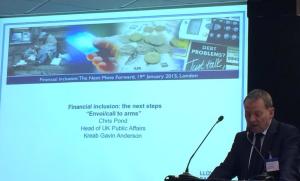By Chris Pond
29.04.2015
The United Kingdom leads the world in financial services and yet more than two million adult Britons don’t have a bank account. In the autumn of 2014, the Financial Inclusion Commission came together to find out why, and to put the issue on the political agenda ahead of the General Election.
Formed from a non-partisan, cross-party group of experts and parliamentarians, my fellow commissioners and I took evidence from more than 84 different organisations from around the country. Among them were banks, community finance institutions, trade associations, insurance companies, charities, local authorities, housing providers, academics, other financial service providers and those who are or who have been financially excluded.
Their evidence informed the report we published recently, Financial Inclusion Commission: Improving the health of the nation in which we identify twenty key recommendations for the next Parliament. These cover leadership, banking and payments, credit and debt, savings and pensions, insurance and financial capability.
As part of this we are calling for the next government to make community finance institutions more sustainable since the evidence we heard suggested that while credit unions and community development finance institutions can help address the low income credit gap, the sector has struggled to meet demand. Indeed, it is estimated that the current credit gap between demand and supply is about £5billion.
A future government should look to create more sustainable community finance institutions by making the sector more investible, and helping lenders and investors understand the relationship between risk and returns. To do this they should promote measures to lift the APR cap on credit unions, develop a better understanding of business models and risk among lenders and investors, and help community lenders to attract a wider customer base.
Financial inclusion is not a party political issue, its a necessity which makes economic as well as social policy sense. In a financially civilised society everybody – individuals, firms, society as a whole – gains from having every adult connected, in the right way and at the right price, to the regular, and therefore regulated, financial system.
At the start of this process our aim was to put the issue on the political agenda ahead of the General Election. We were therefore delighted to see commitments from all three main political parties to promote financial inclusion and community finance in the next Parliament. However the work doesn’t stop here: we now need to turn promises into action.
Chris Pond is Vice-Chair of the Financial Inclusion Commission
The report of the Financial Inclusion Commission is available here.
Financial Inclusion Commission: Improving the health of the nation was published in March 2015 based on written submissions and oral sessions in London, Liverpool, Cardiff and Glasgow.

